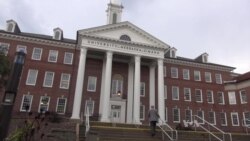Most Americans had little knowledge of Afghanistan when the central Asian nation became headline news in 1979, when a communist government backed by the Soviet Union took control in Kabul and several years of civil war began.
At that time the only place in the United States with longstanding academic connections to Afghanistan was the University of Nebraska at Omaha, out in the middle of the U.S. heartland.
Journalists and foreign policy advisers looking for expertise turned to Omaha. The same thing happened after September 11, 2001, when the Afghanistan-based al-Qaida group carried out terrorist attacks against the United States.
Connection
How was it that Omaha, Nebraska, a mid-sized city on the Missouri River across from Iowa, headquarters of the Union Pacific railroad, a few insurance companies, and some agricultural and food-processing operations, had become the go-to place for experts on Afghanistan?
In 1972, a young geography professor named Christian Jung started the only U.S.-based research center for the study of Afghanistan at the university in Omaha.
In 1974, the center took on an archive of books and materials donated by Arthur Paul, who had served as an economic adviser to the Afghan government in the 1960s.
Paul's archive material became the foundation for what would become the largest collection of Afghanistan cultural material and documents outside the country itself.
Basketball diplomacy
That same year, Jung, who was only 33 at the time, died. A former Peace Corps volunteer in Afghanistan named Tom Gouttierre took over as director of the Afghanistan Studies Center.
For the next 41 years the lanky, energetic man, known as “Mr. Tom” to many of his former students in Afghanistan, would guide and shape the direction of the center and familiarize people in Omaha with an exotic land on the other side of the world.
Gouttierre and his wife, Marylu, had gone to Afghanistan as Peace Corps volunteers in 1965 to teach. But soon afterward some young men asked “Mr. Tom” to be their basketball coach.
Although he had played the game, Gouttierre did not consider himself to be particularly qualified to coach. But he took on the task and taught the boys how to work together as a team.
They were able to beat the few other schools that had teams, which led to Gouttierre being asked to coach Afghanistan’s national team -- a position he held until he and his wife’s Peace Corps tour ended in 1967.
A few years later, after graduate school in Indiana and a return to Afghanistan under a Fullbright fellowship, Gouttierre became a basketball coach, this time for Kabul University.
Notables
By then, he had become fluent in Dari, thanks in no small part to the tutoring his basketball players had provided. During his time in Kabul, he would meet a number of Afghans who later gained world fame, including future President Hamid Karzai and Khaled Hosseini, who would go on to write the best-selling novel The Kite Runner.
When he took over as director of the Afghanistan Studies Center at the University of Nebraska at Omaha in 1974, Gouttierre brought a wealth of experience, enthusiasm and a love for the country that few other Americans could have matched.
Over the years, he and his team, including other UNO professors and students as well as visiting scholars from Afghanistan, developed projects that would help Afghanistan’s people as well as forge stronger connections between the schools and people.
The center printed thousands of textbooks in Dari and Pashto that were used in Afghan refugee camps in Pakistan as well as parts of Afghanistan during the Soviet occupation and later when the Taliban took control.
After the U.S. intervention that ended Taliban rule, the Afghanistan Studies Center began bringing Afghan teachers to Omaha for five-week intensive training programs. These teachers, many of them women, would return to their country to train others, thus multiplying the effect.
Impact on education
Abdul Rasheem Yaseer, the center’s assistant director who has been in Omaha for four decades, said that program had a great impact on Afghanistan’s education system.
Gouttierre, now 75, retired at the end of July. He and Marylu still live near the university campus and he continues to assist with some programs there.
The new director, 37- year-old Sher Jan Ahmadzai, owes part of his early education in a Pakistan refugee camp to books printed by the Afghanistan Studies Center.
Ahmadzai served for a time as an aide to President Karzai.
He is an enthusiastic supporter of the center’s goals and programs, even though funding is not at the level it once was. He and the other staff members in Omaha are determined to carry on the mission that began in 1972 and was carried forward for 41 years by the former Peace Corps volunteer-turned scholar, who to many middle-aged former Afghan basketball players is still remembered as “Mr. Tom.”






